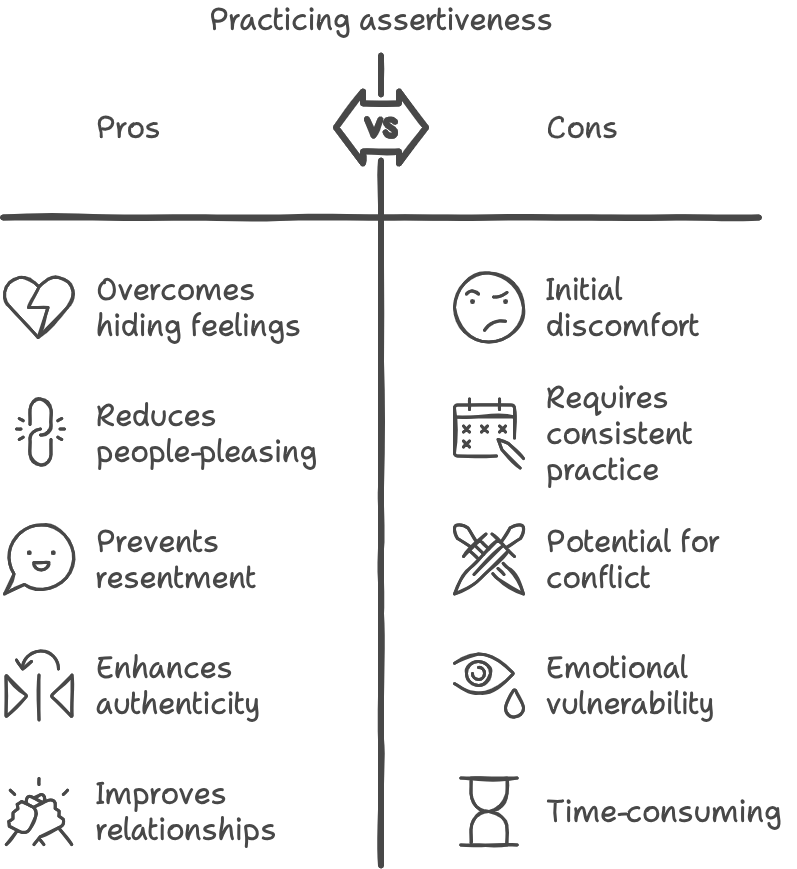ADHD and Daily Assertiveness Skills: Practice Ideas
Practicing Daily Assertiveness Skills: Your Guide to Confidence and Clarity
📌 TL;DR
- 🟢Assertiveness is challenging, especially for ADHD women who may struggle with people-pleasing.
- 🟢Developing assertiveness is key to healthy relationships, reducing anxiety, and boosting self-esteem.
- 🟢Techniques include self-reflection, using "I" statements, practicing saying no, role-playing, and seeking feedback.
Why Assertiveness Matters for ADHD Women
For ADHD women, practicing assertiveness skills is crucial to overcoming the tendency to hide thoughts and feelings, people-please, and let resentment and anger build up. It's part of healing and living more authentically in the world and in your relationships.What Is Assertiveness?
Assertiveness is a balanced communication style that allows you to express your thoughts, feelings, and needs openly and honestly without being aggressive. This vital skill is essential for maintaining healthy relationships, reducing anxiety, and improving self-esteem. Being assertive means standing up for yourself while also respecting the rights and feelings of others.The Importance of Practicing Assertiveness Daily
For women with ADHD, practicing assertiveness is required to replace the ingrained habits of people-pleasing, hiding who you are, and masking. Here's why it's crucial to make assertiveness a daily habit:- 🟢 Enhances Self-Esteem: Regularly asserting yourself helps instill a sense of worth and confidence, affirming that your voice matters.
- 🟢 Reduces Stress: Addressing conflicts and expressing your needs can prevent resentment and stress from building up, which is crucial for managing ADHD symptoms.
- 🟢 Improves Relationships: Clear communication fosters mutual respect and understanding in personal and professional relationships.
- 🟢 Encourages Personal Growth: Embracing assertiveness challenges you to confront your fears and vulnerabilities, leading to personal development.

Daily Assertiveness Exercises
Here are some practical exercises to incorporate into your daily routine to enhance your assertiveness skills:1. Start with Self-Reflection
At the beginning or end of each day, take a few minutes to reflect on your interactions from yesterday. Ask yourself:- 🟢 Did I express my thoughts and feelings clearly?
- 🟢 Were there moments I avoided asserting myself?
- 🟢 How did I feel about those interactions?
2. Use “I” Statements
Reframe your communication by focusing on your feelings and opinions. Instead of saying, “You never include me,” try, “I feel left out when I’m not invited.” This emphasizes your feelings without placing blame, making it easier to communicate assertively without sparking conflict.3. Practice Saying No
Saying no can be challenging, but it’s essential for maintaining boundaries. At least once a week, practice declining a request. Use phrases like:- 🟢 “I cannot take that on right now, but thank you for thinking of me.”
- 🟢 “I have other commitments that I need to prioritize.”
4. Role-Playing Scenarios
Find a trusted friend or family member to practice assertive communication through role-playing. Simulate situations where you need to assert yourself, such as negotiating for a raise or addressing a conflict. This practice can build your confidence in real-life situations.5. Write Assertive Affirmations
Create a list of positive affirmations that reflect your assertiveness goals. Examples include:- 🟢 “I have the right to express my needs.”
- 🟢 “My feelings are valid, and I deserve to be heard.”
6. Utilize Feedback
Request feedback from peers or loved ones about your assertiveness. Ask them how they perceive your communication style, and be open to constructive criticism. Use this input for personal growth, especially if ADHD makes recognizing how you come across in conversations challenging.Incorporate Assertiveness into Your Daily Life
Making assertiveness a daily practice doesn’t have to be overwhelming. Here are some tips to help you integrate it seamlessly into your routine:- 🟢 Set Daily Goals: Identify one interaction where you will practice being assertive each morning.
- 🟢 End Your Day with Gratitude: Reflect on at least one instance where you successfully communicated your needs or feelings. Gratitude reinforces positive behavior and boosts confidence.
- 🟢 Be Mindful of Your Body Language: Nonverbal cues greatly influence assertiveness. Stand tall and use open gestures to convey confidence. It might not be possible to do this, and that's okay. But you deserve to take up space.
- 🟢 Educate Yourself: Read books, attend workshops, or seek out resources that can help you develop assertiveness skills.
I recommend these two:
1. "When I Say No I Feel Guilty: How to Cope, Using the Skills of Systematic Assertive Therapy" by Manuel J. Smith, PhD
-
-
- Summary: This book is a comprehensive guide to assertiveness training, authored by a pioneer in the field, Manuel J. Smith. It introduces the concept of the "Bill of Assertive Rights" and helps readers understand the roots of their lack of assertiveness. The book offers practical techniques for challenging self-limiting beliefs and developing the confidence to express one's needs and desires effectively.
- Link: When I Say No I Feel Guilty on Amazon
-
2. "Your Perfect Right: Assertiveness and Equality in Your Life and Relationships" by Robert Alberti, PhD, and Michel Emmons, PhD
-
-
- Summary: Written by two of the founders of assertiveness training, this book delves into the psychological roots of assertiveness issues and provides strategies for improving assertiveness, particularly in personal relationships. The authors emphasize that how you say something is often more important than what you say. This book is considered a classic in the field and is highly regarded for its practical advice and insights.
- Link: Your Perfect Right on Amazon
-




